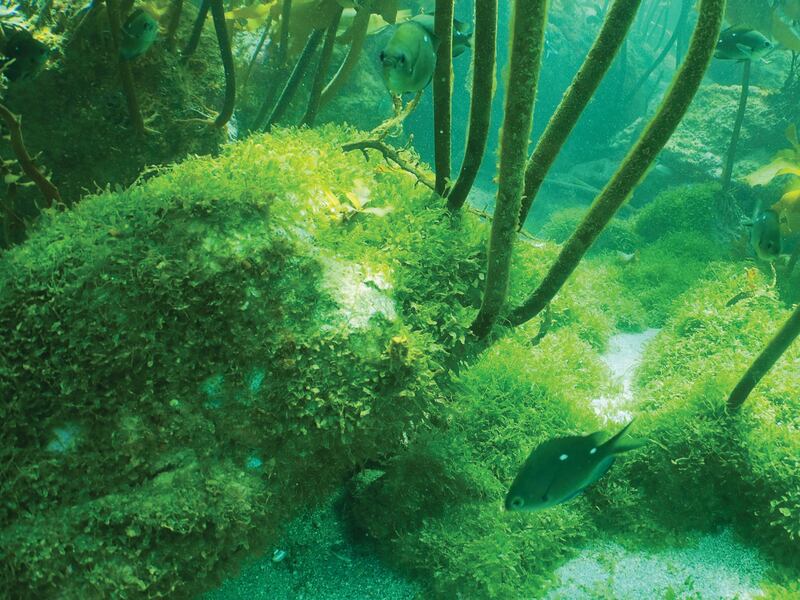Ngāti Rehua/Ngāti wai ki Aotea, the mana whenua and mana moana of Aotea (Great Barrier Island), has filed a Waitangi Tribunal claim against the Crown over what it says is uncontrolled spread of the invasive Caulerpa seaweed, marine pest.
In a scathing submission, the claim asserts the Crown’s failure to act has subjected Ngāti Rehua to degradation and pollution of its waters, undermining its rights under Te Tiriti o Waitangi, as well as enabling the spread of the bright green invasive weed, which smothers entire marine ecosystems.
“The introduction of this invasive species has inflicted mamae among our people, as it poses a severe threat to the mauri of our marine ecosystem,” Kelly Klink, the lead claimant says in court documents seen by teaomaori.news on Thursday.
Caluerpa was first discovered on Aotea, Great Barrier Island two years ago. The invasive seaweed outcompetes and chokes native marine plants, wiping out entire habitats for fish, shellfish and other marine life.
The claim alleges although the Crown, via the Ministry of Primary Industries (MPI) was aware of the existence and effects of Caulerpa in July of 2021, officials failed to notify and engage with the iwi, it says.
By the time Iwi had instituted their own rāhui in their waters, the species had already spread from one port to three, including the island’s biggest Rangitawhiri (Tryphena), and Whangaparapara.
Two months ago MPI said the weed had spread to Te Tai Tokerau (Northland) and last month Biosecurity NZ found it near Kawau island in Tāmaki Makaurau.
Wrong iwi, too late
Ngāti wai ki Aotea alleges MPI should have been acting with it to halt the spread for the past two years but instead consulted with a mainland iwi, thus breaching its Treaty duties and exacerbating the spread.
“Auckland City and Te Papa Atawhai officially recognise Ngāti Rehua Ngātiwai ki Aotea Trust Board,” Klink said in a separate evidential statement to the tribunal.
“This engagement did not come through the mandated authority for our island.”
Accompanying the claim is a video depicting Okupe (Blind Bay) on Aotea, now entirely overrun by densely packed Caulerpa, with the sand barely visible beneath swaths of the seaweed.
MPI tabled the idea of blanketing the Caluerpa that has arrived in Tāmaki Makaurau with tarpaulins and then poisoning it with chlorine pellets, last month - an idea slammed by Klink when speaking to TeAoMāori.news.
“That goes against everything we stand for.”
The moana needed a mātauranga-Māori centric approach, Klink said.
MPI acknowledged in a July policy document that while the chlorine had been effective in the United States, Australia had done a trial with salt, and it was also effective.
“Salt is logistically bulky so becomes less practical over large areas of many hectares.” the document said, in its justification for chlorine.
Klink said so far the Iwi had been “relying on its own limited resources to mount an opposition to the spread and existence of Caulerpa in its waters”.
“Moreover, against its wishes, Ngāti Rehua has been forced to rely on the efforts of others who do not have mana over the waters and lands of Aotea to carry on the battle against Caulerpa,” she said.
Klink said a series of self-funded trials of a tikanga-led approach had in fact shown some promise in one of their infected bays, and they would be looking to expand it but needed support.
The claim seeks a finding of negligence by the Crown, and recommendations for the Crown to work in partnership with Ngāti Rehua to address the infestation.
“As a result of the Crown’s actions and inactions, Ngāti Rehua has experienced pollution of the waters of Aotea, and elsewhere; mamae over that pollution, loss of mana by being unable to resist and warn others effectively” the claim states.
“Ngāti Rehua seeks recommendations that the Crown and all its instrumentalities work on an equal partnership basis with Ngāti Rehua to reach a mutual determination of how to resist and eradicate Caulerpa in their waters including funding and other support necessary to support restoration of the marine environment and the mana of Ngāti Rehua..”


